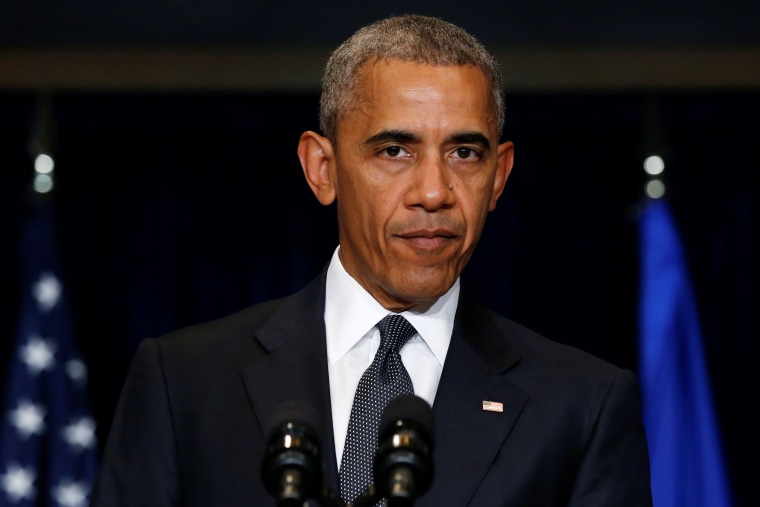President Barack Obama's tenure in office will be defined in part by the unique challenge he has faced when it comes to confronting tensions that exist between law enforcement and communities of color.
A gulf between the police and the people they are supposed to protect and serve existed long before Obama was elected, and yet as the first black president, he has had to straddle a difficult divide. He is both expected to articulate the rage and pain of minorities who feel that they are unfairly profiled and persecuted, while not alienating America's dogged law enforcement officials, who have no desire to suffer from guilt by association every time there is a case of excessive force.
"On the one hand, he represents 'the authorities' at the highest level and must represent everyone, yet he is also a black man who cannot betray reality nor deny the existence of racial violence he knows is very real," freelance writer and commentator David A. Love told NBC News of Friday. "With President Obama, the post-racial America never came, which was unrealistic to assume in the first place. And that is why he finds himself trapped in this manner."
Just seven months into his presidency, Obama experienced how tenuous a position he is in when his friend Harvard professor Henry Louis Gates Jr., who is black, was arrested while trying to enter his own home — in an incident that was fraught with racial implications.
When discussing the encounter during a press conference, Obama said the arresting officer in the case (who happened to be white) had acted "stupidly," which immediately drew wide condemnation and a swift rebuke from many white Americans who have historically held positive views of the police.
Polls at the time showed a precipitous drop in support for the president from whites — his 2008 post-victory honeymoon was effectively over. There was a sense among some that the president had taken sides. Right-wing radio host Rush Limbaugh said at the time that Obama had "played the race card." A case could be made that his image with some whites never recovered.
Related: Powerful Guns Made Dallas Ambush 'More Deadly and Tragic': Obama
Obama attempted a mea culpa by holding a widely publicized "beer summit" at the White House with Gates and the officer who detained him. But that act only provoked eyerolls in some quarters of the black community, in which some had grown tired of promises of a "national dialogue" and "teachable moments" on race, and expected real structural change with the election of the first president of color.
As the steady drumbeat of controversial police actions have continued (alongside mass shootings and the deaths of several unarmed black men and women at the hands of whites), the president has vacillated between words of empathy and calls for better training, equipment and other forms of tangible action.
Obama has spoken candidly about the fact that he himself or his theoretical son could very well have suffered the same fate as slain youths in Sanford, Florida, or Ferguson, Missouri. He shed tears in public for the lives of young people senselessly cut down by a deranged killer. He has even led a church in song in a moment of national catharsis following yet another slaughter motivated by hate. And of course Obama has repeatedly, tirelessly called for more gun control to curb the violence which has increasingly plagued our nation's cities.
Related: Dallas Police Ambush: 'Heartbroken' Political Leaders Express Dismay
And yet, it seems as though the president can't satisfy his many constituencies. He has been accused of politicizing tragedies while at the same time been attacked for not being radical enough. All the while, polarizing inertia in Washington has prevented any real legislative breakthroughs.
"There is no way that the president can or should be blamed for this mess. One man cannot single-handedly fix the problem that is America's cauldron of police violence. After all, this is hundreds of years in the making," said Love. "The real culprit is white denial and the systemic and ingrained criminalization of black people."
At the time of the Gates arrest, polling reflected the fact that whites and blacks had polar opposite perceptions of police. The overwhelming majority of whites believed that both races were treated equally and fairly by police, while similar numbers of African-Americans said that they were by and large treated worse.
In the years since, which have been dominated by headlines and visceral cell phone footage of violent police encounters, the numbers have not changed much. Some seek to blame that disconnect on the president, which Sam Fulwood, a senior fellow at the Center for American Progress, believes runs counter to historical precedents.
Related: Dallas Suspect Was Upset About Recent Police Shootings, 'Wanted to Kill White People'
"All presidents are perpetually placed in the uncomfortable position of balancing politics and policies. The two don’t fit neatly together all of the time. President Obama is not an exception," he told NBC News on Friday.
"The compelling point about this president being scrutinized more so — on matters of race — is the unique burden he has [in having] no choice other than to suck it up and deal with other people’s attitudes about how he should confront, specifically, race and policing. I think Obama has handled this well, speaking first as president of the United States and, on occasion, as a black man living in this country," Fulwood added. "For some folks, he’s not done this enough, and for some folks he’s done it too much. Such is the plight of being the first and only."
